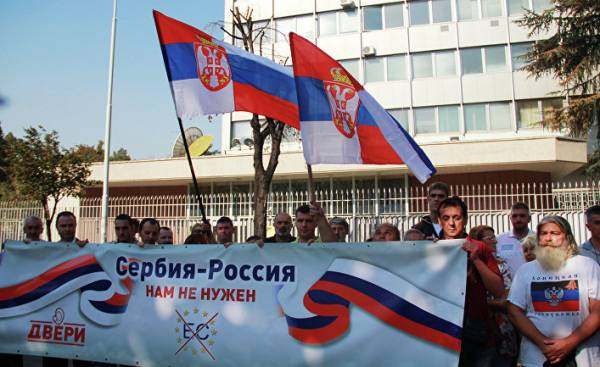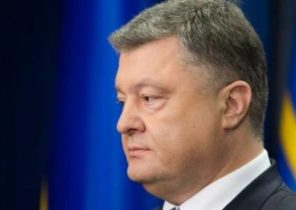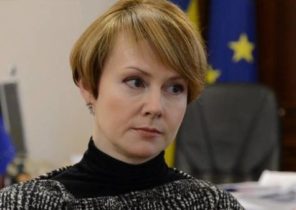
The most popular phrases related to Russia that you can find in the Serbian “Google” are the following: “the Russian is the Serb,” “Russian are Serbian tribe”, “Russian descended from Serbs”. Trying to comment on this phenomenon was made Nikola Tanasic, philosopher and analyst of the portal “New Serbian political thought”. The article was published February 23 in our printed version of the “R Store”, which is a Supplement to the newspaper “Nedeni”.
Serbian illusions about the Russian and Russia have a lot of reasons, but the main reason, that is, one that has led to the current spread megalomanic ideas of “Russian Serbian tribe”, is the overall decline of education, the degradation of the enlightenment (especially its impact on public discourse), hypertrophy of information in the Internet age and, of course, the notorious “yellowing” of the media, and with them the public. It is well known that a great love of the Serbian people to the Russian disproportionate awareness of the Serbian people of Russian. With the huge gaps in the Serbian historical knowledge, as a rule, kompensiruet myths, originating in the Serbian folklore, and is often outright lies and fabrications.
Here we should note the two circumstances, and both of them are related to adapting Western paradigms in the formation of the Serbian educational historiography. More than a hundred years of Serbian history textbooks were written on the model of Western (German, French and others), and Russia appeared, and appeared in them as a factor only after Peter the great’s reforms (when Russia “joined the club” of Western States). Little information about Russia in the 18th century often only served the introduction to the story of the conflict of Napoleon with Russia. For a large part of Europe this clash was the first acquaintance with Russia as a historical force. Thus, in history textbooks, which were used for decades are described, for example, the hundred years war between England and France and the Crusades, but no mention was not, for example, about the battle of Kulikovo, the Novgorod Republic, and even the Baptism of Rus.
Except for the lack of Russian in the school curriculum, the role played by the fact that among the Serbs, especially in the second half of the 20th century, has spread a great distrust of the official historiography. First of all, it was due to the fact that in Yugoslavia for political reasons roughly “retouched” the recent history of Serbian and South Slavic peoples on the needs of the official ideology, preaching the unity of the South Slavs. Exposed historical falsification along with widespread among Serbs dissatisfaction with the “German school” of historiography, whose interest in the history of the Slavs was due to the attempts to falsify and even to write off from the accounts of Slavic history, undermined the people’s confidence in the historiography as a science. But if educated people it was not a problem for the uneducated it was the reason to admit any evidence-based discussion of the history meaningless, and any fiction or your own imagination to put on the same level with serious historiographical studies that were carried out with the involvement of relevant sources.
If we add all these to become today universal access to information online, where anyone can write anything, and where there are few who checks the sources and validity of that reading, we get the current situation. Today fantastic prose of pseudo-historians and laymen, some of whom don’t even hide the fact that is fiction, not science, the Internet has become more popular, serious, dry and lengthy historical monographs, where nothing is presented in black and white, there is nothing definite, and information is fragmented into small and digestible segments that are easy to read uneducated people.
All this has put us in a situation where a considerable part of Serbian public has essentially fancy ideas about Serbian history. Pseudo-historians, for which neither the Golden period of Serbian history is not quite brilliant, inventing stories about “ancient Serbia”, which existed even prior to all written records about Slavic peoples (before written history as such). In these tales of “ancient” and “original Serbia” appears to be a kind of “ancient America”: the most militarily powerful country with the most developed technology and the most highly developed from the point of view of the culture of society, which, despite all its achievements, it is not clear what happened. Although such fantasies “buy” very few of our fellow citizens, they leave their mark in the public consciousness. In Serbia is no longer fashionable to speak of “Slavs”. First, due to the sad experiences associated with the political experiment in the form of Yugoslavia, and secondly, because of the distrust most of the “Slavic brothers” — especially the Croats and the Bulgarians (as nearest neighbors). Interestingly, there is one regional trend. All the former Nations of Yugoslavia invented by ancestors who were not Slavs: whether the ancient Macedonians, Thracians, Illyrians, Celts, Etruscans and other peoples. This leads to the fact that in Serbia the brotherhood with Russia is often not regarded in the context of Slavic brotherhood, as it was in the 19th century. Relations with Russia declared a deep personal and exclusive, and any other Slavic people of them is excluded, because “they all turned back to Russia, and only the Serbs — no.”
And from the idea that “Serbs and Russians are the only real Slavs” to the idea that “Serbs and Russians — one special tribe” (and again no names, let’s call it “Serbs”), just a few steps to go through which is particularly simple in terms of when you do not need to burden yourself with finding sources and specific data. Given the existence of Internet, where you can read anything, and the situation when anybody any more does not trust the enlightenment, when the enlightenment and historiography grossly manipulated for political purposes (especially in other countries in the region), there is nothing surprising in the fact that the Serbs indulged in dreams and treat their political frustration caused by a new story, appropriating the successes of their great brethren, the close kinship which no one disputes.
How to deal with it? Knowledge is the only patient, extensive and long-term “treatment” readers, serious historiographical research, scientific and popular programs on Russian and Serbian history and relationships. The main problem is that fictional stories popular, easy to remember and pleasant to the ear, whereas the true story is often unpleasant, painful and difficult to digest. Therefore, the fabrications and the lies always win a victory over truth, but the passage of time, the truth always finds its defenders in authentic science and authentic history and always comes to the fore.
The author is a philosopher and an analyst of the portal “New Serbian political thought”.







